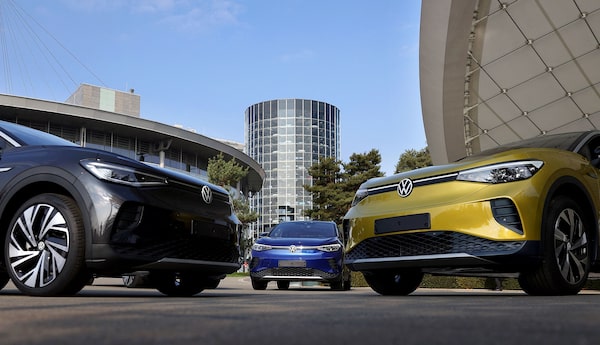
New Volkswagen ID.4 electric vehicles are ready for delivery at the automaker's customer centre in Wolfsburg, Germany, on March 26, 2021.RONNY HARTMANN/AFP/Getty Images
Every traditional car company is rolling out electric vehicles – lots of them. But only one, Volkswagen, is betting the farm on EVs. The wholesale embrace of one technology seems like an astonishingly risky move. Even rival BMW thinks so.
Last week, VW, the world’s biggest automaker, unveiled its Tesla-killer strategy, though in reality the German company is already eating Tesla’s lunch in Europe. Last year, VW became the leading maker of EVs in Europe and sold more of them in that market than Tesla.
The next stage of its strategy is aimed at displacing Tesla as the global leader in battery-powered cars. VW boss Herbert Diess plans to surpass the California company in total EV sales by 2025, even as Elon Musk’s electric baby ramps up production in Europe and Asia. More than a few analysts think the German company will reach that goal far earlier. If Tesla EVs are the industry’s road-going iPhones, VW is set to become its Samsung, they say.
The company’s plans are truly ambitious. It intends to spend €33-billion ($49-billion) in the next decade on EVs, equivalent to a quarter of its market value, which has climbed more than 100 per cent in the past year as its strategy captures the imagination of investors.
VW predicts all-electric vehicles to account for 70 per cent of total European car sales by 2030 and more than 50 per cent in China and the United States. Its new “MEB” platform will underpin dozens of electric models, the first of which was the ID.3 hatchback. It hit showrooms last year, is already a hot seller and is to be followed by the ID.4 SUV. The company will build six battery factories in Europe alone and 35,000 charging stations around the world.
Tesla’s EV domination seems set to end, even though its battery technology and EV software are superior to VW’s. In its favour, VW is a design and manufacturing powerhouse with vast global reach, ambition to match and ample profits and cash reserves to fund its EV drive. It was only a matter of time before VW got highly annoyed watching Tesla’s market value double, then double again, making it worth almost as much as the rest of the global auto industry. Mr. Diess’s message: Enough!
What could go wrong?
One-way bets on a single technology are rarely a good idea, and no company knows that more than VW. In the 1990s, VW and Europe’s other car giants pinned their futures on diesel technology. Diesel engines emitted less carbon dioxide than gasoline engines, and European refiners needed a market for diesel fuel.
Governments subsidized diesel fuel prices and dropped the taxes on diesel cars, ensuring it became the fuel of choice across Europe (it never took off in North America). It all worked well until 2012, when the United Nations said diesel fumes can be carcinogenic. The biggest blow came three years later, when VW handed the world the Dieselgate scandal with the discovery of its “cheat” technology, which disguised the real-world emissions of its diesel cars.
VW’s all-out bet on diesel has been replaced by an all-out bet on batteries. It looks risky, for a trunk load of reasons. While EV prices will come down as production numbers increase, they might not come down a lot because the costs of the key materials that go into them – steel, nickel, copper, cobalt, lithium, among others – are all surging. EVs remain luxury products.
BMW is hedging, building models that can come in many versions – gasoline, hybid, plug-in hybrid and all-electric. “We think a one-propulsion strategy could be very dangerous,” BMW boss Oliver Zipse told Bloomberg Television this month. “The likelihood that 150, 160 markets in a very short period of time – and one decade is a very short period of time – will converge fully into one drivetrain is highly unlikely.” (Toyota has a similar view and is adding hydrogen fuel-cell cars to its fleet.)
VW has evidently concluded that its all-EV strategy is less risky than it appears, but you would never get its executives to admit why. In short, the company has close government connections in Germany, and its bankruptcy is unimaginable.
VW’s ownership and governance structure does not follow North American capitalism norms. The state of Lower Saxony owns almost 12 per cent of the company’s equity and controls 20 per cent of the votes. The supervisory board includes several high-ranking members of the state government and representatives of the employee works council.
While the German government itself has no direct VW ownership, it has always treated the company as a crucial partner in a vital industry. The government’s lavish EV purchase incentives, recently extended through 2025, are just one bit of evidence of its affection for its biggest industrial champion.
U.S. car companies are pushing EVs, too, but their battery mania is somewhat more tempered than VW’s. Perhaps they know that an all-out bet on EVs is premature and that, if they get it wrong, they could go into Chapter 11 bankruptcy, as General Motors and Chrysler did after the 2008 financial crisis. VW’s EV game is part of the German government’s industrial strategy. The United States does not have the same strategy, or any strategy, for U.S. automakers. And that might be a good thing.
Your time is valuable. Have the Top Business Headlines newsletter conveniently delivered to your inbox in the morning or evening. Sign up today.
 Eric Reguly
Eric Reguly